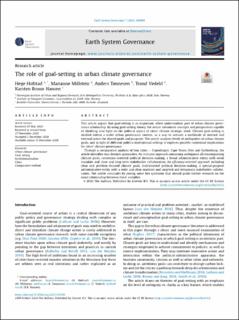| dc.contributor.author | Hofstad, Hege | |
| dc.contributor.author | Millstein, Marianne | |
| dc.contributor.author | Tønnesen, Anders | |
| dc.contributor.author | Vedeld, Trond | |
| dc.contributor.author | Hansen, Karsten Bruun | |
| dc.date.accessioned | 2021-06-16T12:02:12Z | |
| dc.date.available | 2021-06-16T12:02:12Z | |
| dc.date.created | 2021-02-22T15:49:40Z | |
| dc.date.issued | 2020-12-11 | |
| dc.identifier.citation | Earth System Governance. 2021, 7, (1-10). | en_US |
| dc.identifier.issn | 2589-8116 | |
| dc.identifier.uri | https://hdl.handle.net/11250/2759765 | |
| dc.description.abstract | This article argues that goal-setting is an important, albeit understudied, part of urban climate governance scholarship. By using goal-setting theory, the article introduces concepts and perspectives capable of shedding new light on the political aspect of cities' climate strategic work. Climate goal-setting is studied within a wider urban governance context, as a way to activate a multitude of internal and external actors for shared goals and purposes. The article analyses levels of ambiguities of urban climate goals, and in light of different politico-institutional settings it explores possible contextual implications for cities’ climate governance. Through a comparative analysis of four cities – Copenhagen, Cape Town, Oslo and Gothenburg, the article identifies two distinct approaches. An inclusive approach containing ambiguous all-encompassing climate goals, consensus-oriented political decision-making, a broad administrative entity with weak mandate and close and long-term stakeholder collaboration. An efficiency-oriented approach including clear and problem focused climate goals, instrumental political decision-making, a special-purpose administrative entity with a wide and clear mandate and targeted and temporary stakeholder collaboration. The article concludes by posing some key questions that should guide further research on the exact relationship between these variables. | en_US |
| dc.language.iso | eng | en_US |
| dc.publisher | Elseveir | en_US |
| dc.relation.ispartofseries | Earth System Governance;volume 7 | |
| dc.rights | Navngivelse 4.0 Internasjonal | * |
| dc.rights.uri | http://creativecommons.org/licenses/by/4.0/deed.no | * |
| dc.subject | Urban climate governances | en_US |
| dc.subject | Goal settings | en_US |
| dc.subject | Institutionalization | en_US |
| dc.subject | Cities | en_US |
| dc.subject | Comparative methods | en_US |
| dc.title | The role of goal-setting in urban climate governance | en_US |
| dc.type | Peer reviewed | en_US |
| dc.type | Journal article | en_US |
| dc.description.version | publishedVersion | en_US |
| dc.rights.holder | © 2020 The Authors. | en_US |
| dc.source.articlenumber | 100088 | en_US |
| cristin.ispublished | true | |
| cristin.fulltext | original | |
| dc.identifier.doi | https://doi.org/10.1016/j.esg.2020.100088 | |
| dc.identifier.cristin | 1892468 | |
| dc.source.journal | Earth System Governance | en_US |
| dc.source.volume | 7 | en_US |
| dc.source.pagenumber | 10 | en_US |
| dc.relation.project | Norges forskningsråd: 270668 | en_US |

